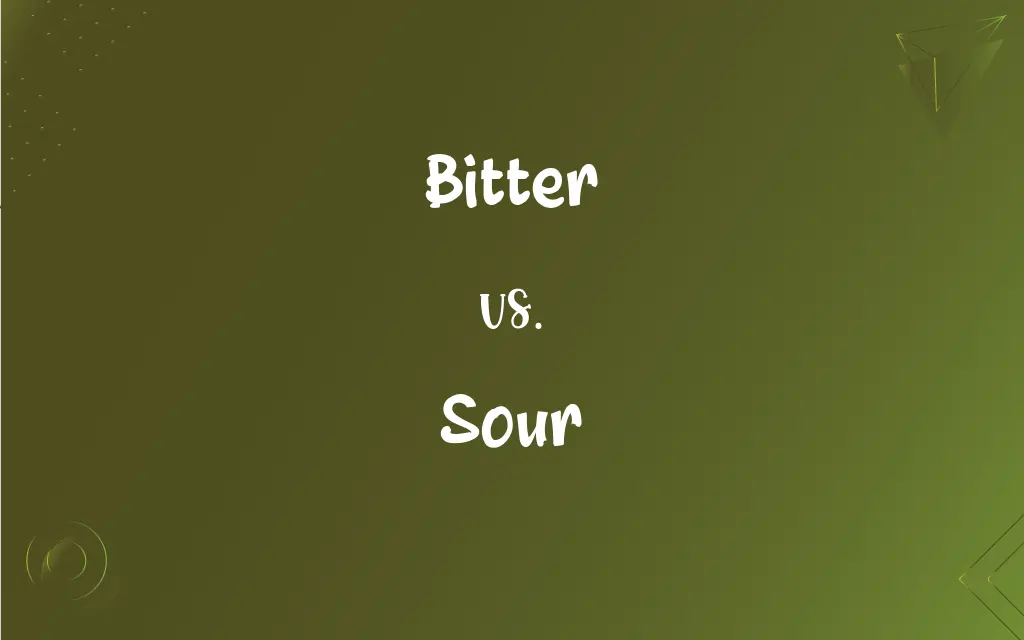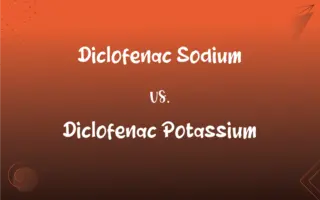Bitter vs. Sour: What's the Difference?
Edited by Aimie Carlson || By Harlon Moss || Updated on June 9, 2024
Bitter is a sharp, pungent taste often linked to compounds like alkaloids, while sour is the taste associated with acids like citric acid in lemons.

Key Differences
Bitter and sour are two distinct primary tastes perceived by the human palate. Bitterness is often linked to certain compounds such as alkaloids found in plants, acting as a natural defense mechanism to deter herbivores. On the contrary, sourness arises from the presence of acids, like the citric acid found in citrus fruits.
Recognizing the difference between bitter and sour is crucial, as these tastes often serve as signals for the body. Historically, a bitter taste can indicate the presence of potential toxins, making us wary of consuming such items. Conversely, a sour taste typically signals the presence of harmless, naturally occurring acids, though it can also indicate spoilage in some foods.
Beverages provide clear examples of bitter and sour tastes. Coffee and certain teas possess a natural bitterness, resulting from compounds they contain. In contrast, beverages like lemonade or certain fermented drinks exhibit a sour taste, derived from their acidic components.
Culinary practices worldwide utilize both bitter and sour flavors. In many cuisines, bitterness is introduced deliberately using specific ingredients like bitter gourds or certain herbs. Sourness, on the other hand, is often incorporated using vinegars, citrus juices, or fermented products to enhance or balance a dish.
While bitter and sour are primarily taste descriptors, they can also describe emotional experiences. People might describe an unfortunate event as leaving a "bitter taste" or refer to someone in a bad mood as "sour-faced."
ADVERTISEMENT
Comparison Chart
Associated Compound
Often linked to alkaloids
Commonly tied to acids
Natural Indication
Can indicate potential toxins
Signals presence of acids; might indicate spoilage in foods
Common in
Coffee, certain teas, dark chocolate
Lemonade, fermented drinks, vinegars
Used in Cooking for
Introducing a pungent, sharp taste
Balancing or enhancing flavors
Emotional Descriptors
Can describe resentment or regret
Can indicate displeasure or bad mood
ADVERTISEMENT
Bitter and Sour Definitions
Bitter
Often linked to certain plant compounds.
The plant's natural defense made it taste bitter.
Sour
Commonly found in citrus fruits.
He loved the sour kick of lime in his drink.
Bitter
A sharp, pungent primary taste.
The medicine left a bitter taste in her mouth.
Sour
A primary taste associated with acids.
The lemon was too sour to eat on its own.
Bitter
Used in beverages like coffee.
She preferred her coffee bitter without any sugar.
Sour
Can indicate spoilage in some foods.
The milk smelled sour and had to be thrown away.
Bitter
Can describe an emotional experience of resentment.
The team had a bitter defeat last season.
Sour
Can describe someone in a bad mood.
He woke up on the sour side of the bed today.
Bitter
Can indicate potential toxins in foods.
He was cautious about the bitter-tasting berry.
Sour
Used in cooking to enhance or balance flavors.
She added some vinegar to give the dish a sour note.
Bitter
Having or being a taste that is sharp, acrid, and unpleasant.
Sour
Having a taste characteristic of that produced by acids; sharp, tart, or tangy.
Bitter
Causing a sharply unpleasant, painful, or stinging sensation; harsh
Enveloped in bitter cold.
A bitter wind.
Sour
Made acid or rancid by fermentation.
FAQs
What does "bitter" mean?
"Bitter" describes a sharp, pungent taste that is often considered unpleasant, like that of unsweetened cocoa or certain medicinal drugs.
Which foods are commonly described as "bitter"?
Dark chocolate, coffee, certain greens like kale, and tonic water are examples.
Is "bitter" an adjective?
Yes, "bitter" is primarily an adjective, but it can also be a noun in some contexts.
Can "bitter" describe feelings?
Yes, "bitter" can describe feelings of deep anger, resentment, or disappointment.
Is bitterness one of the basic tastes?
Yes, bitterness is one of the five primary taste sensations alongside sweet, sour, salty, and umami.
Why do some plants have a bitter taste?
Bitterness in plants often serves as a defense mechanism to deter herbivores or indicate potential toxicity.
Is bitterness always undesirable in food?
No, some cuisines and recipes intentionally incorporate bitter elements for balance or flavor depth.
Can "sour" describe feelings?
Yes, "sour" can describe feelings of displeasure or resentment, as in "sour mood."
What does "sour" mean?
"Sour" describes a taste that is acidic and tart, like that of lemons or vinegar.
How is "sour" used in a sentence?
"The milk has gone sour, and it's not safe to drink."
How is "bitter" used metaphorically?
It's often used to describe feelings, e.g., "a bitter dispute" or "a bitter memory."
Is "sour" an adjective?
Yes, primarily. But "sour" can also be a noun referring to a sour substance or thing.
How is the word "sour" related to music?
In music, "sour" can describe a note that's off-pitch.
How is "bitter" used in a sentence?
"She had a bitter expression after tasting the medicine."
Which foods are commonly described as "sour"?
Lemons, limes, sour cream, and fermented foods like sauerkraut are examples.
Is sourness one of the basic tastes?
Yes, sourness is one of the five primary taste sensations.
Is "sour grapes" a common idiom?
Yes, "sour grapes" refers to pretending to disdain something one cannot have.
Can "sour" describe relationships or interactions?
Yes, for instance, "Their friendship turned sour after the disagreement."
Can "bitter" be a noun?
Yes, it can refer to things that have a bitter taste or, in British context, a type of pale ale.
What causes foods to become sour?
Sourness typically results from the presence of acids. Fermentation can also produce sour-tasting compounds.
About Author
Written by
Harlon MossHarlon is a seasoned quality moderator and accomplished content writer for Difference Wiki. An alumnus of the prestigious University of California, he earned his degree in Computer Science. Leveraging his academic background, Harlon brings a meticulous and informed perspective to his work, ensuring content accuracy and excellence.
Edited by
Aimie CarlsonAimie Carlson, holding a master's degree in English literature, is a fervent English language enthusiast. She lends her writing talents to Difference Wiki, a prominent website that specializes in comparisons, offering readers insightful analyses that both captivate and inform.































































